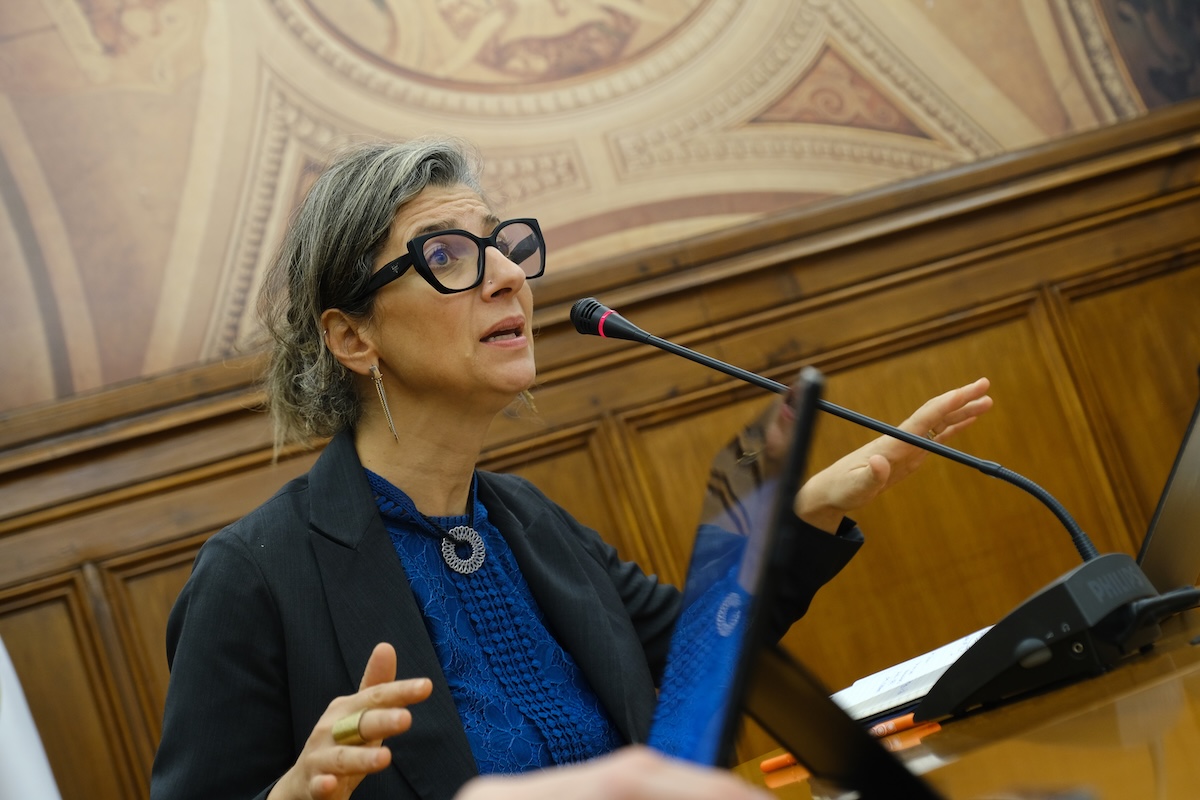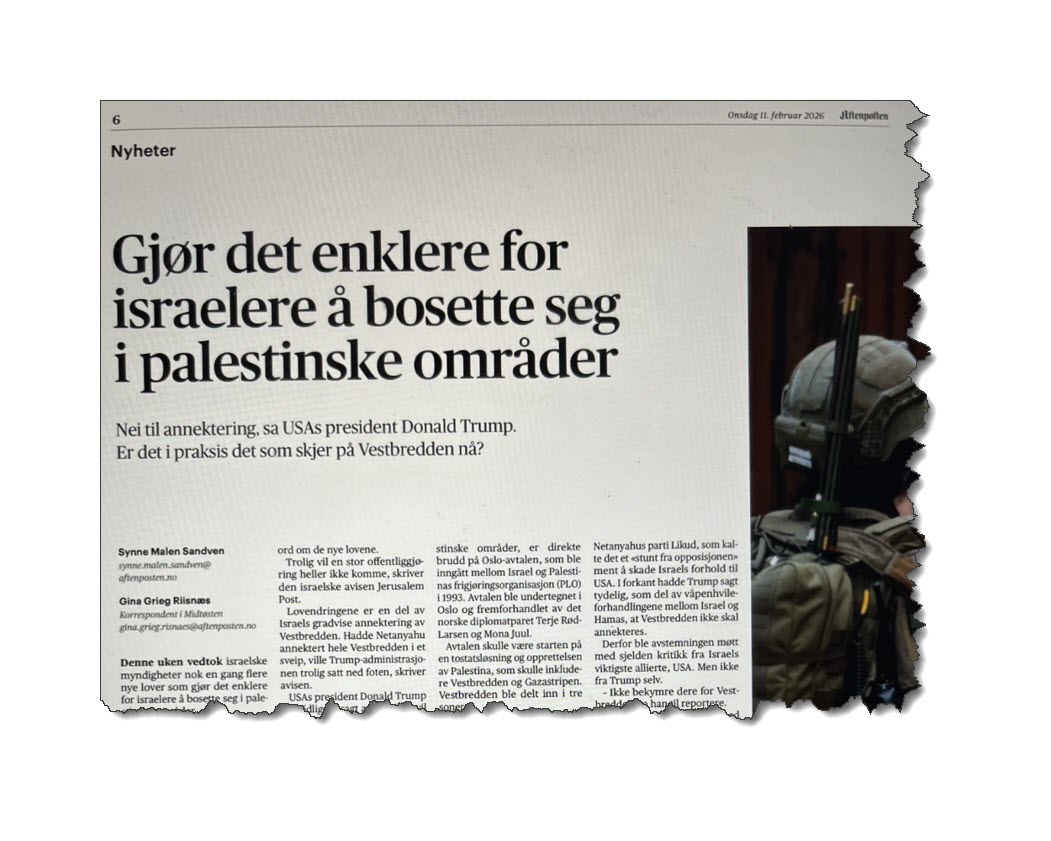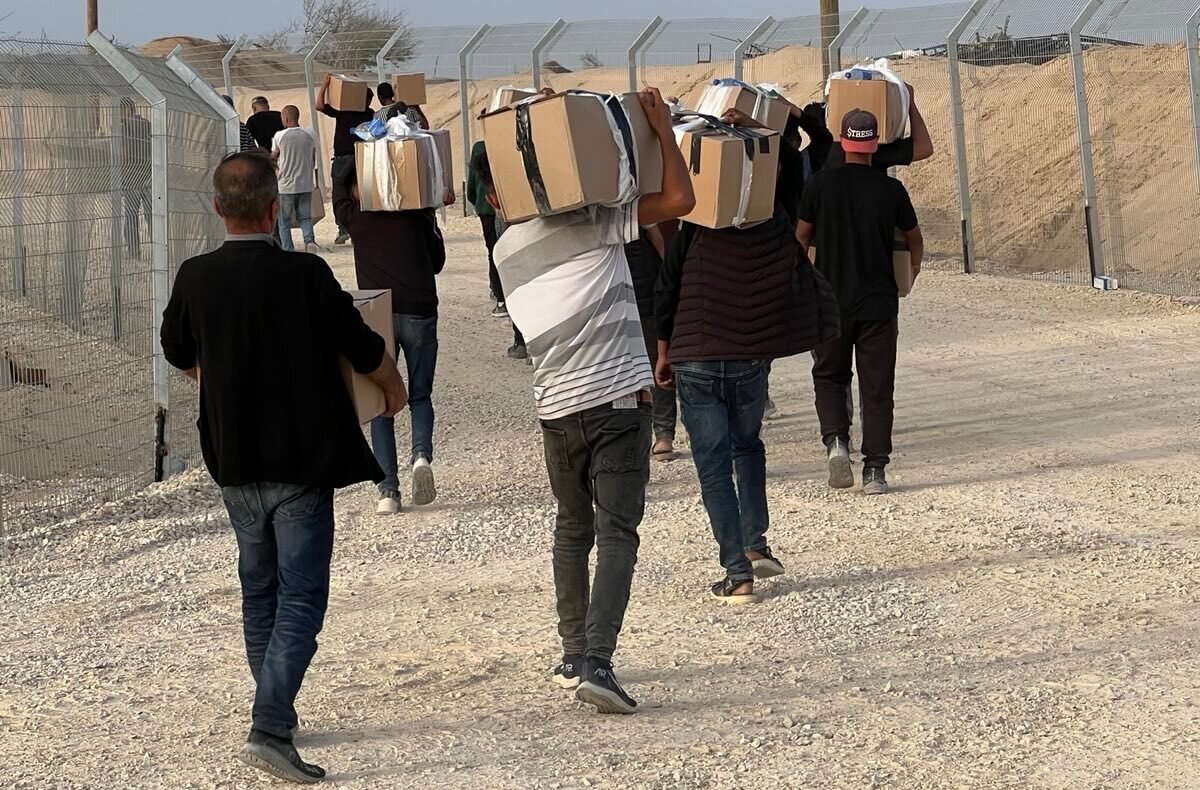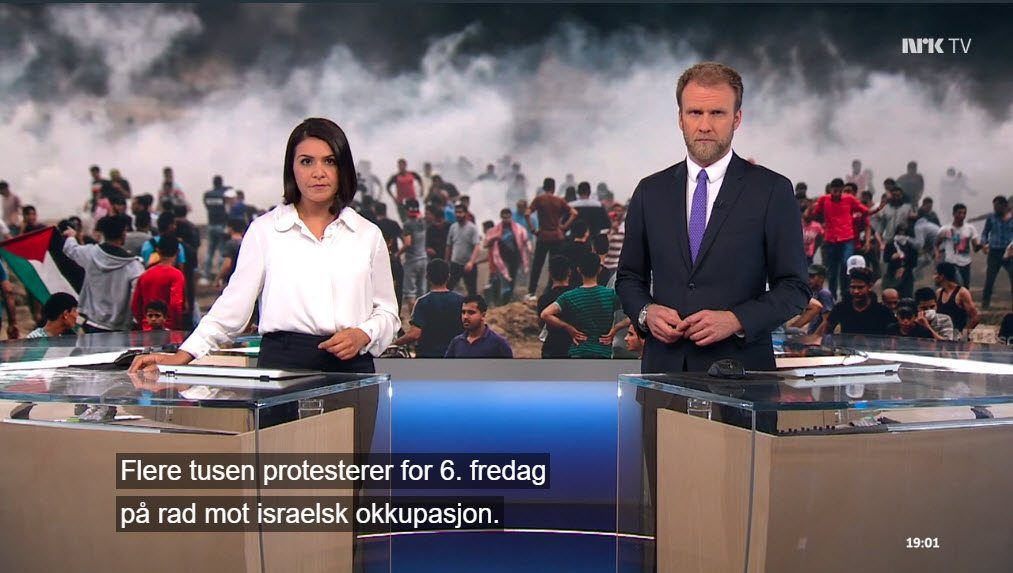Oslo II-avtalen ble signert 28. september 1995.
Under følger tekst i engelsk oversettelse.
Kilde er Ariel Center for Policy Research.
OSLO II AGREEMENT
Washington, DC, September 28, 1995
Israeli-Palestinian Interim Agreement on the West Bank and the Gaza Strip
The Government of the State of Israel and the Palestine Liberation Organization (hereinafter «the PLO»), the representative of the Palestinian people;
PREAMBLE
WITHIN the framework of the Middle East peace process initiated at Madrid in October 1991;
REAFFIRMING their determination to put an end to decades of confrontation and to live in peaceful coexistence, mutual dignity and security, while recognizing their mutual legitimate and political rights;
REAFFIRMING their desire to achieve a just, lasting and comprehensive peace settlement and historic reconciliation through the agreed political process;
RECOGNIZING that the peace process and the new era that it has created, as well as the new relationship established between the two Parties as described above, are irreversible, and the determination of the two Parties to maintain, sustain and continue the peace process;
RECOGNIZING that the aim of the Israeli-Palestinian negotiations within the current Middle East peace process is, among other things, to establish a Palestinian Interim Self-Government Authority, i.e. the elected Council (hereinafter «the Council» or «the Palestinian Council»), and the elected Ra’ees of the Executive Authority, for the Palestinian people in the West Bank and the Gaza Strip, for a transitional period not exceeding five years from the date of signing the Agreement on the Gaza Strip and the Jericho Area (hereinafter «the Gaza-Jericho Agreement») on May 4, 1994, leading to a permanent settlement based on Security Council Resolutions 242 and 338;
REAFFIRMING their understanding that the interim self-government arrangements contained in this Agreement are an integral part of the whole peace process, that the negotiations on the permanent status, that will start as soon as possible but not later than May 4, 1996, will lead to the implementation of Security Council Resolutions 242 and 338, and that the Interim Agreement shall settle all the issues of the interim period and that no such issues will be deferred to the agenda of the permanent status negotiations;
REAFFIRMING their adherence to the mutual recognition and commitments expressed in the letters dated September 9, 1993, signed by and exchanged between the Prime Minister of Israel and the Chairman of the PLO;
DESIROUS of putting into effect the Declaration of Principles on Interim Self-Government Arrangements signed at Washington, D.C. on September 13, 1993, and the Agreed Minutes thereto (hereinafter «the DOP») and in particular Article III and Annex I concerning the holding of direct, free and general political elections for the Council and the Ra’ees of the Executive Authority in order that the Palestinian people in the West Bank, Jerusalem and the Gaza Strip may democratically elect accountable representatives;
RECOGNIZING that these elections will constitute a significant interim preparatory step toward the realization of the legitimate rights of the Palestinian people and their just requirements and will provide a democratic basis for the establishment of Palestinian institutions;
REAFFIRMING their mutual commitment to act, in accordance with this Agreement, immediately, efficiently and effectively against acts or threats of terrorism, violence or incitement, whether committed by Palestinians or Israelis;
FOLLOWING the Gaza-Jericho Agreement; the Agreement on Preparatory Transfer of Powers and Responsibilities signed at Erez on August 29, 1994 (hereinafter «the Preparatory Transfer Agreement»); and the Protocol on Further Transfer of Powers and Responsibilities signed at Cairo on August 27, 1995 (hereinafter «the Further Transfer Protocol»); which three agreements will be superseded by this Agreement;
HEREBY AGREE as follows:
CHAPTER I – THE COUNCIL
ARTICLE I
Transfer of Authority
Israel shall transfer powers and responsibilities as specified in this Agreement from the Israeli military government and its Civil Administration to the Council in accordance with this Agreement. Israel shall continue to exercise powers and responsibilities not so transferred.
Pending the inauguration of the Council, the powers and responsibilities transferred to the Council shall be exercised by the Palestinian Authority established in accordance with the Gaza-Jericho Agreement, which shall also have all the rights, liabilities and obligations to be assumed by the Council in this regard. Accordingly, the term «Council» throughout this Agreement shall, pending the inauguration of the Council, be construed as meaning the Palestinian Authority.
The transfer of powers and responsibilities to the police force established by the Palestinian Council in accordance with Article XIV below (hereinafter «the Palestinian Police») shall be accomplished in a phased manner, as detailed in this Agreement and in the Protocol concerning Redeployment and Security Arrangements attached as Annex I to this Agreement (hereinafter «Annex I»).
As regards the transfer and assumption of authority in civil spheres, powers and responsibilities shall be transferred and assumed as set out in the Protocol Concerning Civil Affairs attached as Annex III to this Agreement (hereinafter «Annex III»).
After the inauguration of the Council, the Civil Administration in the West Bank will be dissolved, and the Israeli military government shall be withdrawn. The withdrawal of the military government shall not prevent it from exercising the powers and responsibilities not transferred to the Council.
A Joint Civil Affairs Coordination and Cooperation Committee (hereinafter «the CAC»), Joint Regional Civil Affairs Subcommittees, one for the Gaza Strip and the other for the West Bank, and District Civil Liaison Offices in the West Bank shall be established in order to provide for coordination and cooperation in civil affairs between the Council and Israel, as detailed in Annex III.
The offices of the Council, and the offices of its Ra’ees and its Executive Authority and other committees, shall be located in areas under Palestinian territorial jurisdiction in the West Bank and the Gaza Strip.
ARTICLE II
Elections
In order that the Palestinian people of the West Bank and the Gaza Strip may govern themselves according to democratic principles, direct, free and general political elections will be held for the Council and the Ra’ees of the Executive Authority of the Council in accordance with the provisions set out in the Protocol concerning Elections attached as Annex II to this Agreement (hereinafter «Annex II»).
These elections will constitute a significant interim preparatory step towards the realization of the legitimate rights of the Palestinian people and their just requirements and will provide a democratic basis for the establishment of Palestinian institutions.
Palestinians of Jerusalem who live there may participate in the election process in accordance with the provisions contained in this Article and in Article VI of Annex II (Election Arrangements concerning Jerusalem).
The elections shall be called by the Chairman of the Palestinian Authority immediately following the signing of this Agreement to take place at the earliest practicable date following the redeployment of Israeli forces in accordance with Annex I, and consistent with the requirements of the election timetable as provided in Annex II, the Election Law and the Election Regulations, as defined in Article I of Annex II.
ARTICLE III
Structure of the Palestinian Council
The Palestinian Council and the Ra’ees of the Executive Authority of the Council constitute the Palestinian Interim Self-Government Authority, which will be elected by the Palestinian people of the West Bank, Jerusalem and the Gaza Strip for the transitional period agreed in Article I of the DOP.
The Council shall possess both legislative power and executive power, in accordance with Articles VII and IX of the DOP. The Council shall carry out and be responsible for all the legislative and executive powers and responsibilities transferred to it under this Agreement. The exercise of legislative powers shall be in accordance with Article XVIII of this Agreement (Legislative Powers of the Council).
The Council and the Ra’ees of the Executive Authority of the Council shall be directly and simultaneously elected by the Palestinian people of the West Bank, Jerusalem and the Gaza Strip, in accordance with the provisions of this Agreement and the Election Law and Regulations, which shall not be contrary to the provisions of this Agreement.
The Council and the Ra’ees of the Executive Authority of the Council shall be elected for a transitional period not exceeding five years from the signing of the Gaza-Jericho Agreement on May 4, 1994.
Immediately upon its inauguration, the Council will elect from among its members a Speaker. The Speaker will preside over the meetings of the Council, administer the Council and its committees, decide on the agenda of each meeting, and lay before the Council proposals for voting and declare their results.
The jurisdiction of the Council shall be as determined in Article XVII of this Agreement (Jurisdiction).
The organization, structure and functioning of the Council shall be in accordance with this Agreement and the Basic Law for the Palestinian Interim Self-government Authority, which Law shall be adopted by the Council. The Basic Law and any regulations made under it shall not be contrary to the provisions of this Agreement.
The Council shall be responsible under its executive powers for the offices, services and departments transferred to it and may establish, within its jurisdiction, ministries and subordinate bodies, as necessary for the fulfillment of its responsibilities.
The Speaker will present for the Council’s approval proposed internal procedures that will regulate, among other things, the decision-making processes of the Council.
ARTICLE IV
Size of the Council
The Palestinian Council shall be composed of 82 representatives and the Ra’ees of the Executive Authority, who will be directly and simultaneously elected by the Palestinian people of the West Bank, Jerusalem and the Gaza Strip.
ARTICLE V
The Executive Authority of the Council
The Council will have a committee that will exercise the executive authority of the Council, formed in accordance with paragraph 4 below (hereinafter «the Executive Authority»).
The Executive Authority shall be bestowed with the executive authority of the Council and will exercise it on behalf of the Council. It shall determine its own internal procedures and decision making processes.
The Council will publish the names of the members of the Executive Authority immediately upon their initial appointment and subsequent to any changes.
The Ra’ees of the Executive Authority shall be an ex officio member of the Executive Authority.
All of the other members of the Executive Authority, except as provided in subparagraph c. below, shall be members of the Council, chosen and proposed to the Council by the Ra’ees of the Executive Authority and approved by the Council.
The Ra’ees of the Executive Authority shall have the right to appoint some persons, in number not exceeding twenty percent of the total membership of the Executive Authority, who are not members of the Council, to exercise executive authority and participate in government tasks. Such appointed members may not vote in meetings of the Council.
Non-elected members of the Executive Authority must have a valid address in an area under the jurisdiction of the Council.
ARTICLE VI
Other Committees of the Council
The Council may form small committees to simplify the proceedings of the Council and to assist in controlling the activity of its Executive Authority.
Each committee shall establish its own decision-making processes within the general framework of the organization and structure of the Council.
ARTICLE VII
Open Government
All meetings of the Council and of its committees, other than the Executive Authority, shall be open to the public, except upon a resolution of the Council or the relevant committee on the grounds of security, or commercial or personal confidentiality.
Participation in the deliberations of the Council, its committees and the Executive Authority shall be limited to their respective members only. Experts may be invited to such meetings to address specific issues on an ad hoc basis.
ARTICLE VIII
Judicial Review
Any person or organization affected by any act or decision of the Ra’ees of the Executive Authority of the Council or of any member of the Executive Authority, who believes that such act or decision exceeds the authority of the Ra’ees or of such member, or is otherwise incorrect in law or procedure, may apply to the relevant Palestinian Court of Justice for a review of such activity or decision.
ARTICLE IX
Powers and Responsibilities of the Council
Subject to the provisions of this Agreement, the Council will, within its jurisdiction, have legislative powers as set out in Article XVIII of this Agreement, as well as executive powers.
The executive power of the Palestinian Council shall extend to all matters within its jurisdiction under this Agreement or any future agreement that may be reached between the two Parties during the interim period. It shall include the power to formulate and conduct Palestinian policies and to supervise their implementation, to issue any rule or regulation under powers given in approved legislation and administrative decisions necessary for the realization of Palestinian self-government, the power to employ staff, sue and be sued and conclude contracts, and the power to keep and administer registers and records of the population, and issue certificates, licenses and documents.
The Palestinian Council’s executive decisions and acts shall be consistent with the provisions of this Agreement.
The Palestinian Council may adopt all necessary measures in order to enforce the law and any of its decisions, and bring proceedings before the Palestinian courts and tribunals.
In accordance with the DOP, the Council will not have powers and responsibilities in the sphere of foreign relations, which sphere includes the establishment abroad of embassies, consulates or other types of foreign missions and posts or permitting their establishment in the West Bank or the Gaza Strip, the appointment of or admission of diplomatic and consular staff, and the exercise of diplomatic functions.
Notwithstanding the provisions of this paragraph, the PLO may conduct negotiations and sign agreements with states or international organizations for the benefit of the Council in the following cases only:
economic agreements, as specifically provided in Annex V of this Agreement:
agreements with donor countries for the purpose of implementing arrangements for the provision of assistance to the Council,
agreements for the purpose of implementing the regional development plans detailed in Annex IV of the DOP or in agreements entered into in the framework of the multilateral negotiations, and
cultural, scientific and educational agreements. Dealings between the Council and representatives of foreign states and international organizations, as well as the establishment in the West Bank and the Gaza Strip of representative offices other than those described in subparagraph 5.a above, for the purpose of implementing the agreements referred to in subparagraph 5.b above, shall not be considered foreign relations.
Subject to the provisions of this Agreement, the Council shall, within its jurisdiction, have an independent judicial system composed of independent Palestinian courts and tribunals.
CHAPTER 2 – REDEPLOYMENT AND SECURITY ARRANGEMENTS
ARTICLE X
Redeployment of Israeli Military Forces
The first phase of the Israeli military forces redeployment will cover populated areas in the West Bank – cities, towns, villages, refugee camps and hamlets – as set out in Annex I, and will be completed prior to the eve of the Palestinian elections, i. e., 22 days before the day of the elections.
Further redeployments of Israeli military forces to specified military locations will commence after the inauguration of the Council and will be gradually implemented commensurate with the assumption of responsibility for public order and internal security by the Palestinian Police, to be completed within 18 months from the date of the inauguration of the Council as detailed in Articles XI (Land) and XIII (Security), below and in Annex I.
The Palestinian Police shall be deployed and shall assume responsibility for public order and internal security for Palestinians in a phased manner in accordance with XIII (Security) below and Annex I.
Israel shall continue to carry the responsibility for external security, as well as the responsibility for overall security of Israelis for the purpose of safeguarding their internal security and public order.
For the purpose of this Agreement, «Israeli military forces» includes Israel Police and other Israeli security forces.
ARTICLE XI
Land
The two sides view the West Bank and the Gaza Strip as a single territorial unit, the integrity and status of which will be preserved during the interim period.
The two sides agree that West Bank and Gaza Strip territory, except for issues that will be negotiated in the permanent status negotiations, will come under the jurisdiction of the Palestinian Council in a phased manner, to be completed within 18 months from the date of the inauguration of the Council, as specified below:
Land in populated areas (Areas A and B), including government and Al Waqf land, will come under the jurisdiction of the Council during the first phase of redeployment.
All civil powers and responsibilities, including planning and zoning, in Areas A and B, set out in Annex III, will be transferred to and assumed by the Council during the first phase of redeployment.
In Area C, during the first phase of redeployment Israel will transfer to the Council civil powers and responsibilities not relating to territory, as set out in Annex III.
The further redeployments of Israeli military forces to specified military locations will be gradually implemented in accordance with the DOP in three phases, each to take place after an interval of six months, after the inauguration of the Council, to be completed within 18 months from the date of the inauguration of the Council.
During the further redeployment phases to be completed within 18 months from the date of the inauguration of the Council, powers and responsibilities relating to territory will be transferred gradually to Palestinian jurisdiction that will cover West Bank and Gaza Strip territory, except for the issues that will be negotiated in the permanent status negotiations.
The specified military locations referred to in Article X, paragraph 2 above will be determined in the further redeployment phases, within the specified time-frame ending not later than 18 months from the date of the inauguration of the Council, and will be negotiated in the permanent status negotiations.
For the purpose of this Agreement and until the completion of the first phase of the further redeployments:
«Area A» means the populated areas delineated by a red line and shaded in brown on attached map No. 1;
«Area B» means the populated areas delineated by a red line and shaded in yellow on attached map No. 1, and the built-up area of the hamlets listed in Appendix 6 to Annex I, and
«Area C» means areas of the West Bank outside Areas A and B, which, except for the issues that will be negotiated in the permanent status negotiations, will be gradually transferred to Palestinian jurisdiction in accordance with this Agreement.
ARTICLE XII
Arrangements for Security and Public Order
In order to guarantee public order and internal security for the Palestinians of the West Bank and the Gaza Strip, the Council shall establish a strong police force as set out in Article XIV below. Israel shall continue to carry the responsibility for defense against external threats, including the responsibility for protecting the Egyptian and Jordanian borders, and for defense against external threats from the sea and from the air, as well as the responsibility for overall security of Israelis and Settlements, for the purpose of safeguarding their internal security and public order, and will have all the powers to take the steps necessary to meet this responsibility.
Agreed security arrangements and coordination mechanisms are specified in Annex I.
A Joint Coordination and Cooperation Committee for Mutual Security Purposes (hereinafter «the JSC»), as well as Joint Regional Security Committees (hereinafter «RSCs») and Joint District Coordination Offices (hereinafter «DCOs»), are hereby established as provided for in Annex I.
The security arrangements provided for in this Agreement and in Annex I may be reviewed at the request of either Party and may be amended by mutual agreement of the Parties. Specific review arrangements are included in Annex I.
For the purpose of this Agreement, «the Settlements» means, in the West Bank the settlements in Area C; and in the Gaza Strip – the Gush Katif and Erez settlement areas, as well as the other settlements in the Gaza Strip, as shown on attached map No. 2.
ARTICLE XIII
Security
The Council will, upon completion of the redeployment of Israeli military forces in each district, as set out in Appendix 1 to Annex I, assume the powers and responsibilities for internal security and public order in Area A in that district.
There will be a complete redeployment of Israeli military forces from Area B. Israel will transfer to the Council and the Council will assume responsibility for public order for Palestinians. Israel shall have the overriding responsibility for security for the purpose of protecting Israelis and confronting the threat of terrorism.
In Area B the Palestinian Police shall assume the responsibility for public order for Palestinians and shall be deployed in order to accommodate the Palestinian needs and requirements in the following manner:
The Palestinian Police shall establish 25 police stations and posts in towns, villages, and other places listed in Appendix 2 to Annex I and as delineated on map No. 3. The West Bank RSC may agree on the establishment of additional police stations and posts, if required.
The Palestinian Police shall be responsible for handling public order incidents in which only Palestinians are involved.
The Palestinian Police shall operate freely in populated places where police stations and posts are located, as set out in paragraph b(1) above.
While the movement of uniformed Palestinian policemen in Area B outside places where there is a Palestinian police station or post will be carried out after coordination and confirmation through the relevant DCO, three months after the completion of redeployment from Area B, the DCOs may decide that movement of Palestinian policemen from the police stations in Area B to Palestinian towns and villages in Area B on roads that are used only by Palestinian traffic will take place after notifying the DCO.
The coordination of such planned movement prior to confirmation through the relevant DCO shall include a scheduled plan, including the number of policemen, as well as the type and number of weapons and vehicles intended to take part. It shall also include details of arrangements for ensuring continued coordination through appropriate communication links, the exact schedule of movement to the area of the planned operation, including the destination and routes thereto, its proposed duration and the schedule for returning to the police station or post. The Israeli side of the DCO will provide the Palestinian side with its response, following a request for movement of policemen in accordance with this paragraph, in normal or routine cases within one day and in emergency cases no later than 2 hours.
The Palestinian Police and the Israeli military forces will conduct joint security activities on the main roads as set out in Annex I.
The Palestinian Police will notify the West Bank RSC of the names of the policemen, number plates of police vehicles and serial numbers of weapons, with respect to each police station and post in Area B.
Further redeployments from Area C and transfer of internal security responsibility to the Palestinian Police in Areas B and C will be carried out in three phases, each to take place after an interval of six months, to be completed 18 months after the inauguration of the Council, except for the issues of permanent status negotiations and of Israel’s overall responsibility for Israelis and borders.
The procedures detailed in this paragraph will be reviewed within six months of the completion of the first phase of redeployment.
ARTICLE XIV
The Palestinian Police
The Council shall establish a strong police force. The duties, functions, structure, deployment and composition of the Palestinian Police, together with provisions regarding its equipment and operation, as well as rules of conduct, are set out in Annex I.
The Palestinian police force established under the Gaza-Jericho Agreement will be fully integrated into the Palestinian Police and will be subject to the provisions of this Agreement.
Except for the Palestinian Police and the Israeli military forces, no other armed forces shall be established or operate in the West Bank and the Gaza Strip.
Except for the arms, ammunition and equipment of the Palestinian Police described in Annex I, and those of the Israeli military forces, no organization, group or individual in the West Bank and the Gaza Strip shall manufacture, sell, acquire, possess, import or otherwise introduce into the West Bank or the Gaza Strip any firearms, ammunition, weapons, explosives, gunpowder or any related equipment, unless otherwise provided for in Annex I.
ARTICLE XV
Prevention of Hostile Acts
Both sides shall take all measures necessary in order to prevent acts of terrorism, crime and hostilities directed against each other, against individuals falling under the other’s authority and against their property and shall take legal measures against offenders.
Specific provisions for the implementation of this Article are set out in Annex I.
ARTICLE XVI
Confidence Building Measures
With a view to fostering a positive and supportive public atmosphere to accompany the implementation of this Agreement, to establish a solid basis of mutual trust and good faith, and in order to facilitate the anticipated cooperation and new relations between the two peoples, both Parties agree to carry out confidence building measures as detailed herewith:
Israel will release or turn over to the Palestinian side, Palestinian detainees and prisoners, residents of the West Bank and the Gaza Strip. The first stage of release of these prisoners and detainees will take place on the signing of this Agreement and the second stage will take place prior to the date of the elections. There will be a third stage of release of detainees and prisoners. Detainees and prisoners will be released from among categories detailed in Annex VII (Release of Palestinian Prisoners and Detainees). Those released will be free to return to their homes in the West Bank and the Gaza Strip.
Palestinians who have maintained contact with the Israeli authorities will not be subjected to acts of harassment, violence, retribution or prosecution. Appropriate ongoing measures will be taken, in coordination with Israel, in order to ensure their protection.
Palestinians from abroad whose entry into the West Bank and the Gaza Strip is approved pursuant to this Agreement, and to whom the provisions of this Article are applicable, will not be prosecuted for offenses committed prior to September 13, 1993.
CHAPTER 3 – LEGAL AFFAIRS
ARTICLE XVII
Jurisdiction
In accordance with the DOP, the jurisdiction of the Council will cover West Bank and Gaza Strip territory as a single territorial unit, except for:
issues that will be negotiated in the permanent status negotiations: Jerusalem, settlements, specified military locations, Palestinian refugees, borders, foreign relations and Israelis; and
powers and responsibilities not transferred to the Council.
Accordingly, the authority of the Council encompasses all matters that fall within its territorial, functional and personal jurisdiction, as follows:
The territorial jurisdiction of the Council shall encompass Gaza Strip territory, except for the Settlements and the Military Installation Area shown on map No. 2, and West Bank territory, except for Area C which, except for the issues that will be negotiated in the permanent status negotiations, will be gradually transferred to Palestinian jurisdiction in three phases, each to take place after an interval of six months, to be completed 18 months after the inauguration of the Council. At this time, the jurisdiction of the Council will cover West Bank and Gaza Strip territory, except for the issues that will be negotiated in the permanent status negotiations. Territorial jurisdiction includes land, subsoil and territorial waters, in accordance with the provisions of this Agreement.
The functional jurisdiction of the Council extends to all powers and responsibilities transferred to the Council, as specified in this Agreement or in any future agreements that may be reached between the Parties during the interim period.
The territorial and functional jurisdiction of the Council will apply to all persons, except for Israelis, unless otherwise provided in this Agreement.
Notwithstanding subparagraph a. above, the Council shall have functional jurisdiction in Area C, as detailed in Article IV of Annex III.
The Council has, within its authority, legislative, executive and judicial powers and responsibilities, as provided for in this Agreement.
Israel, through its military government, has the authority over areas that are not under the territorial jurisdiction of the Council, powers and responsibilities not transferred to the Council and Israelis.
To this end, the Israeli military government shall retain the necessary legislative, judicial and executive powers and responsibilities, in accordance with international law. This provision shall not derogate from Israel’s applicable legislation over Israelis in personam.
The exercise of authority with regard to the electromagnetic sphere and air space shall be in accordance with the provisions of this Agreement.
Without derogating from the provisions of this Article, legal arrangements detailed in the Protocol Concerning Legal Matters attached as Annex IV to this Agreement (hereinafter «Annex IV») shall be observed. Israel and the Council may negotiate further legal arrangements.
Israel and the Council shall cooperate on matters of legal assistance in criminal and civil matters through a legal committee (hereinafter «the Legal Committee»), hereby established.
The Council’s jurisdiction will extend gradually to cover West Bank and Gaza Strip territory, except for the issues to be negotiated in the permanent status negotiations, through a series of redeployments of the Israeli military forces. The first phase of the redeployment of Israeli military forces will cover populated areas in the West Bank – cities, towns, refugee camps and hamlets, as set out in Annex I – and will be completed prior to the eve of the Palestinian elections, i.e. 22 days before the day of the elections. Further redeployments of Israeli military forces to specified military locations will commence immediately upon the inauguration of the Council and will be effected in three phases, each to take place after an interval of six months, to be concluded no later than eighteen months from the date of the inauguration of the Council.
ARTICLE XVIII
Legislative Powers of the Council
For the purposes of this Article, legislation shall mean any primary and secondary legislation, including basic laws, laws, regulations and other legislative acts.
The Council has the power, within its jurisdiction as defined in Article XVII of this Agreement, to adopt legislation.
While the primary legislative power shall lie in the hands of the Council as a whole, the Ra’ees of the Executive Authority of the Council shall have the following legislative powers
the power to initiate legislation or to present proposed legislation to the Council;
the power to promulgate legislation adopted by the Council; and
the power to issue secondary legislation, including regulations, relating to any matters specified and within the scope laid down in any primary legislation adopted by the Council.
Legislation, including legislation which amends or abrogates existing laws or military orders, which exceeds the jurisdiction of the Council or which is otherwise inconsistent with the provisions of the DOP, this Agreement, or of any other agreement that may be reached between the two sides during the interim period, shall have no effect and shall be void ab initio.
The Ra’ees of the Executive Authority of the Council shall not promulgate legislation adopted by the Council if such legislation falls under the provisions of this paragraph.
All legislation shall be communicated to the Israeli side of the Legal Committee.
Without derogating from the provisions of paragraph 4 above, the Israeli side of the Legal Committee may refer for the attention of the Committee any legislation regarding which Israel considers the provisions of paragraph 4 apply, in order to discuss issues arising from such legislation. The Legal Committee will consider the legislation referred to it at the earliest opportunity.
ARTICLE XIX
Human Rights and the Rule of Law
Israel and the Council shall exercise their powers and responsibilities pursuant to this Agreement with due regard to internationally-accepted norms and principles of human rights and the rule of law.
ARTICLE XX
Rights, Liabilities and Obligations
The transfer of powers and responsibilities from the Israeli military government and its civil administration to the Council, as detailed in Annex III, includes all related rights, liabilities and obligations arising with regard to acts or omissions which occurred prior to such transfer. Israel will cease to bear any financial responsibility regarding such acts or omissions and the Council will bear all financial responsibility for these and for its own functioning.
Any financial claim made in this regard against Israel will be referred to the Council.
Israel shall provide the Council with the information it has regarding pending and anticipated claims brought before any court or tribunal against Israel in this regard.
Where legal proceedings are brought in respect of such a claim, Israel will notify the Council and enable it to participate in defending the claim and raise any arguments on its behalf.
In the event that an award is made against Israel by any court or tribunal in respect of such a claim, the Council shall immediately reimburse Israel the full amount of the award.
Without prejudice to the above, where a court or tribunal hearing such a claim finds that liability rests solely with an employee or agent who acted beyond the scope of the powers assigned to him or her, unlawfully or with willful malfeasance, the Council shall not bear financial responsibility.
Notwithstanding the provisions of paragraphs l.d through l.f above, each side may take the necessary measures, including promulgation of legislation, in order to ensure that such claims by Palestinians including pending claims in which the hearing of evidence has not yet begun, are brought only before Palestinian courts or tribunals in the West Bank and the Gaza Strip, and are not brought before or heard by Israeli courts or tribunals.
Where a new claim has been brought before a Palestinian court or tribunal subsequent to the dismissal of the claim pursuant to subparagraph a. above, the Council shall defend it and, in accordance with subparagraph l.a above, in the event that an award is made for the plaintiff, shall pay the amount of the award.
The Legal Committee shall agree on arrangements for the transfer of all materials and information needed to enable the Palestinian courts or tribunals to hear such claims as referred to in subparagraph b. above, and, when necessary, for the provision of legal assistance by Israel to the Council in defending such claims.
The transfer of authority in itself shall not affect rights, liabilities and obligations of any person or legal entity, in existence at the date of signing of this Agreement.
The Council, upon its inauguration, will assume all the rights, liabilities and obligations of the Palestinian Authority.
For the purpose of this Agreement, «Israelis» also includes Israeli statutory agencies and corporations registered in Israel.
ARTICLE XXI
Settlement of Differences and Disputes
Any difference relating to the application of this Agreement shall be referred to the appropriate coordination and cooperation mechanism established under this Agreement. The provisions of Article XV of the DOP shall apply to any such difference which is not settled through the appropriate coordination and cooperation mechanism, namely:
Disputes arising out of the application or interpretation of this Agreement or any related agreements pertaining to the interim period shall be settled through the Liaison Committee.
Disputes which cannot be settled by negotiations may be settled by a mechanism of conciliation to be agreed between the Parties.
The Parties may agree to submit to arbitration disputes relating to the interim period, which cannot be settled through conciliation. To this end, upon the agreement of both Parties, the Parties will establish an Arbitration Committee.
CHAPTER 4 – COOPERATION
ARTICLE XXII
Relations between Israel and the Council
Israel and the Council shall seek to foster mutual understanding and tolerance and shall accordingly abstain from incitement, including hostile propaganda, against each other and, without derogating from the principle of freedom of expression, shall take legal measures to prevent such incitement by any organizations, groups or individuals within their jurisdiction.
Israel and the Council will ensure that their respective educational systems contribute to the peace between the Israeli and Palestinian peoples and to peace in the entire region, and will refrain from the introduction of any motifs that could adversely affect the process of reconciliation.
Without derogating from the other provisions of this Agreement, Israel and the Council shall cooperate in combating criminal activity which may affect both sides, including offenses related to trafficking in illegal drugs and psychotropic substances, smuggling, and offenses against property, including offenses related to vehicles.
ARTICLE XXIII
Cooperation with Regard to Transfer of Powers and Responsibilities In order to ensure a smooth, peaceful and orderly transfer of powers and responsibilities, the two sides will cooperate with regard to the transfer of security powers and responsibilities in accordance with the provisions of Annex I, and the transfer of civil powers and responsibilities in accordance with the provisions of Annex III.
ARTICLE XXIV
Economic Relations
The economic relations between the two sides are set out in the Protocol on Economic Relations signed in Paris on April 29, 1994, and the Appendices thereto, and the Supplement to the Protocol on Economic Relations all attached as Annex V, and will be governed by the relevant provisions of this Agreement and its Annexes.
ARTICLE XXV
Cooperation Programs
The Parties agree to establish a mechanism to develop programs of cooperation between them. Details of such cooperation are set out in Annex VI.
A Standing Cooperation Committee to deal with issues arising in the context of this cooperation is hereby established as provided for in Annex VI.
ARTICLE XXVI
The Joint Israeli-Palestinian Liaison Committee
The Liaison Committee established pursuant to Article X of the DOP shall ensure the smooth implementation of this Agreement. It shall deal with issues requiring coordination, other issues of common interest and disputes.
The Liaison Committee shall be composed of an equal number of members from each Party. It may add other technicians and experts as necessary.
The Liaison Committee shall adopt its rules of procedures, including the frequency and place or places of its meetings.
The Liaison Committee shall reach its decisions by agreement.
The Liaison Committee shall establish a subcommittee that will monitor and steer the implementation of this Agreement (hereinafter «the Monitoring and Steering Committee»). It will function as follows:
The Monitoring and Steering Committee will, on an ongoing basis, monitor the implementation of this Agreement, with a view to enhancing the cooperation and fostering the peaceful relations between the two sides.
The Monitoring and Steering Committee will steer the activities of the various joint committees established in this Agreement (the JSC, the CAC, the Legal Committee, the Joint Economic Committee and the Standing Cooperation Committee) concerning the ongoing implementation of the Agreement, and will report to the Liaison Committee.
The Monitoring and Steering Committee will be composed of the heads of the various committees mentioned above.
The two heads of the Monitoring and Steering Committee will establish its rules of procedures, including the frequency and places of its meetings.
ARTICLE XXVII
Liaison and Cooperation with Jordan and Egypt
Pursuant to Article XII of the DOP, the two Parties have invited the Governments of Jordan and Egypt to participate in establishing further liaison and cooperation arrangements between the Government of Israel and the Palestinian representatives on the one hand, and the Governments of Jordan and Egypt on the other hand, to promote cooperation between them. As part of these arrangements a Continuing Committee has been constituted and has commenced its deliberations.
The Continuing Committee shall decide by agreement on the modalities of admission of persons displaced from the West Bank and the Gaza Strip in 1967, together with necessary measures to prevent disruption and disorder.
The Continuing Committee shall also deal with other matters of common concern.
ARTICLE XXVIII
Missing Persons
Israel and the Council shall cooperate by providing each other with all necessary assistance in the conduct of searches for missing persons and bodies of persons which have not been recovered, as well as by providing information about missing persons.
The PLO undertakes to cooperate with Israel and to assist it in its efforts to locate and to return to Israel Israeli soldiers who are missing in action and the bodies of soldiers which have not been recovered.
CHAPTER 5 – MISCELLANEOUS PROVISIONS
ARTICLE XXIX
Safe Passage between the West Bank and the Gaza Strip
Arrangements for safe passage of persons and transportation between the West Bank and the Gaza Strip are set out in Annex I.
ARTICLE XXX
Passages
Arrangements for coordination between Israel and the Council regarding passage to and from Egypt and Jordan, as well as any other agreed international crossings, are set out in Annex I.
ARTICLE XXXI
Final Clauses
This Agreement shall enter into force on the date of its signing.
The Gaza-Jericho Agreement, except for Article XX (Confidence-Building Measures), the Preparatory Transfer Agreement and the Further Transfer Protocol will be superseded by this Agreement.
The Council, upon its inauguration, shall replace the Palestinian Authority and shall assume all the undertakings and obligations of the Palestinian Authority under the Gaza-Jericho Agreement, the Preparatory Transfer Agreement, and the Further Transfer Protocol.
The two sides shall pass all necessary legislation to implement this Agreement.
Permanent status negotiations will commence as soon as possible, but not later than May 4, 1996, between the Parties. It is understood that these negotiations shall cover remaining issues, including: Jerusalem, refugees, settlements, security arrangements, borders, relations and cooperation with other neighbors, and other issues of common interest.
Nothing in this Agreement shall prejudice or preempt the outcome of the negotiations on the permanent status to be conducted pursuant to the DOP. Neither Party shall be deemed, by virtue of having entered into this Agreement, to have renounced or waived any of its existing rights, claims or positions.
Neither side shall initiate or take any step that will change the status of the West Bank and the Gaza Strip pending the outcome of the permanent status negotiations.
The two Parties view the West Bank and the Gaza Strip as a single territorial unit, the integrity and status of which will be preserved during the interim period.
The PLO undertakes that, within two months of the date of the inauguration of the Council, the Palestinian National Council will convene and formally approve the necessary changes in regard to the Palestinian Covenant, as undertaken in the letters signed by the Chairman of the PLO and addressed to the Prime Minister of Israel, dated September 9, 1993 and May 4, 1994.
Pursuant to Annex I, Article IX of this Agreement, Israel confirms that the permanent checkpoints on the roads leading to and from the Jericho Area (except those related to the access road leading from Mousa Alami to the Allenby Bridge) will be removed upon the completion of the first phase of redeployment.
Prisoners who, pursuant to the Gaza-Jericho Agreement, were turned over to the Palestinian Authority on the condition that they remain in the Jericho Area for the remainder of their sentence, will be free to return to their homes in the West Bank and the Gaza Strip upon the completion of the first phase of redeployment.
As regards relations between Israel and the PLO, and without derogating from the commitments contained in the letters signed by and exchanged between the Prime Minister of Israel and the Chairman of the PLO, dated September 9, 1993 and May 4, 1994, the two sides will apply between them the provisions contained in Article XXII, paragraph 1, with the necessary changes.
The Preamble to this Agreement, and all Annexes, Appendices and maps attached hereto, shall constitute an integral part hereof.
The Parties agree that the maps attached to the Gaza-Jericho Agreement as:
map No. 1 (The Gaza Strip), an exact copy of which is attached to this Agreement as map No. (in this Agreement «map No. 2»);
map No. 4 (Deployment of Palestinian Police in the Gaza Strip), an exact copy of which is attached to this Agreement as map No. 5 (in this Agreement «map No. 5»); and
map No. 6 (Maritime Activity Zones), an exact copy of which is attached to this Agreement as map No. 8 (in this Agreement «map No. 8»; are an integral part hereof and will remain in effect for the duration of this Agreement.
While the Jeftlik area will come under the functional and personal jurisdiction of the Council in the first phase of redeployment, the area’s transfer to the territorial jurisdiction of the Council will be considered by the Israeli side in the first phase of the further redeployment phases.
Done at Washington DC, this 28th day of September, 1995.
For the Government of the State of Israel:
For the PLO:Witnessed by:
The United States of America
The Russian Federation
The Arab Republic of Egypt
The Hashemite Kingdom of Jordan
The Kingdom of Norway
The European Union












